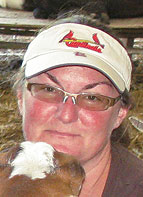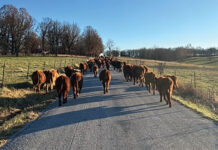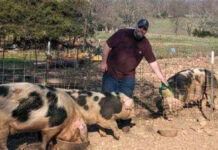
Owned by Lesley and Barry Million, Terrell Creek Farm is located in Webster County near Fordland, Mo. They got their first goats in 2007 for their own personal use. Lesley stated, “We started the business in 2011. It was kind of a justification for me to be able to have goats.”
Lesley and Barry both had jobs in town and were looking for something to do on the farm to help the 55-acre farm pay for itself. She said, “The goats could pay for themselves. It just kind of fell into place.”
Their goats are mostly Nubian. They also have a couple of Alpines and a few crosses. Lesley chose Nubians because of their personalities. “They’re very sweet. They like people. They like to be around people. They have good temperament,” she said. “I like their dangly ears. I like the way they look. They come in all different colors, and I like that, too.”
But her very first milk goat was an Alpine. Lesley said, “I learned how to milk on her. We started out milking by hand.”
They now milk 33 goats using bucket milkers. They have around 50 goats. That includes the milking goats, bucks, kids and yearlings.
In Lesley’s estimation, a good goat will give 8 plus pounds of milk per day. It takes 8.6 pounds of whole goat milk to make a gallon. She added, “There are some that will give a gallon and a half, close to two gallons a day. If it’s a gallon or more, I think that’s a decent milk goat.”
The Millions do not sell goat milk. Lesley explained, “The demand for our cheese is so high we don’t have enough milk to sell. We sell everything we can make and haven’t even begun to reach the demand.”
Lesley said a lot of people in the area are looking for goat milk and are having a hard time getting it. She explained, “I think there is more of a demand because of shows like Food Network and all the cooking shows. I think people are learning more about different kinds of food and getting more adventurous.”
“There’s also a demand for local products. We’re local and sell to the Springfield, Mo., area,” Lesley stated.
Their cheeses can be purchased at Farmers’ Market of the Ozark in Springfield, and the Webb City Market. It is also available at all three Mama Jean’s locations, Homegrown Food, Brown Derby International Wine Center (all in Springfield). There are also several restaurants that purchase their cheese: Farmer’s Gastropub, Metropolitan Farmer, Gilardi’s, Tea Bar and Bites (all in Springfield), and the Bruncheonette in Joplin, Mo.
Lesley said, “You can make any kind of cheese out of goat’s milk that you make out of cow’s milk. There are a few different things that will determine what your final product ends up like. That’s temperature, time, cultures that you add, rennet and amount of rennet, and whether you press it.”
She explained, “You add rennet, which is a coagulate. That’s what makes your protein and calcium and everything mitt together to make your cheese form a curd.”
The Millions make traditional goat cheese called Chevre. Lesley stated, “If a recipe calls for goat cheese, they’re talking about Chevre. We do several different flavors of it.” They also do a variety of other cheeses.
Lesley began just making cheese for her and Barry. She said, “I’m fascinated by the combination of art and science that goes into cheese making.”
“One thing I’ve learned through trial and error about cheese making is a lot of people have kind of a rosy idea about how easy it would be,” Lesley stated. She added, “Cheese making is about 75 to 80 percent dishwashing and cleaning. If you don’t like washing dishes and cleaning then cheese making is not for you.”
Of course there is a difference between cow’s milk and goat’s milk. Lesley said, “Goat’s milk is a little more delicate. It is a little richer; a little sweeter. It’s better with certain styles of cheese than cow’s milk, and vice versa.”
Lesley and Barry are still growing their herd. She said, “We’d like to max out our milking does at 50.”
They are very much hands-on in their dairy goat and cheese making operation. They have a good friend who works there part-time when they’re really busy. Lesley added, “We have a couple of local high school girls that milk for us three times a week, so we get a little bit of a break. They’re really good help.”







